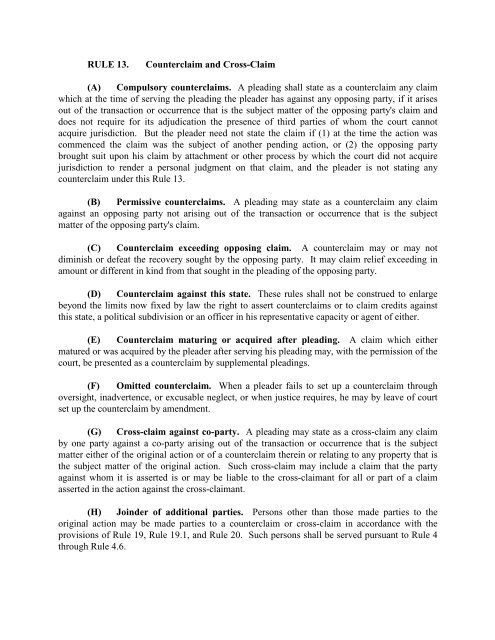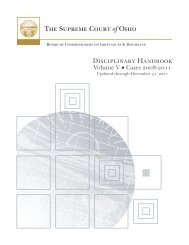Ohio Rules of Civil Procedure - Supreme Court
Ohio Rules of Civil Procedure - Supreme Court
Ohio Rules of Civil Procedure - Supreme Court
You also want an ePaper? Increase the reach of your titles
YUMPU automatically turns print PDFs into web optimized ePapers that Google loves.
RULE 13. Counterclaim and Cross-Claim<br />
(A) Compulsory counterclaims. A pleading shall state as a counterclaim any claim<br />
which at the time <strong>of</strong> serving the pleading the pleader has against any opposing party, if it arises<br />
out <strong>of</strong> the transaction or occurrence that is the subject matter <strong>of</strong> the opposing party's claim and<br />
does not require for its adjudication the presence <strong>of</strong> third parties <strong>of</strong> whom the court cannot<br />
acquire jurisdiction. But the pleader need not state the claim if (1) at the time the action was<br />
commenced the claim was the subject <strong>of</strong> another pending action, or (2) the opposing party<br />
brought suit upon his claim by attachment or other process by which the court did not acquire<br />
jurisdiction to render a personal judgment on that claim, and the pleader is not stating any<br />
counterclaim under this Rule 13.<br />
(B) Permissive counterclaims. A pleading may state as a counterclaim any claim<br />
against an opposing party not arising out <strong>of</strong> the transaction or occurrence that is the subject<br />
matter <strong>of</strong> the opposing party's claim.<br />
(C) Counterclaim exceeding opposing claim. A counterclaim may or may not<br />
diminish or defeat the recovery sought by the opposing party. It may claim relief exceeding in<br />
amount or different in kind from that sought in the pleading <strong>of</strong> the opposing party.<br />
(D) Counterclaim against this state. These rules shall not be construed to enlarge<br />
beyond the limits now fixed by law the right to assert counterclaims or to claim credits against<br />
this state, a political subdivision or an <strong>of</strong>ficer in his representative capacity or agent <strong>of</strong> either.<br />
(E) Counterclaim maturing or acquired after pleading. A claim which either<br />
matured or was acquired by the pleader after serving his pleading may, with the permission <strong>of</strong> the<br />
court, be presented as a counterclaim by supplemental pleadings.<br />
(F) Omitted counterclaim. When a pleader fails to set up a counterclaim through<br />
oversight, inadvertence, or excusable neglect, or when justice requires, he may by leave <strong>of</strong> court<br />
set up the counterclaim by amendment.<br />
(G) Cross-claim against co-party. A pleading may state as a cross-claim any claim<br />
by one party against a co-party arising out <strong>of</strong> the transaction or occurrence that is the subject<br />
matter either <strong>of</strong> the original action or <strong>of</strong> a counterclaim therein or relating to any property that is<br />
the subject matter <strong>of</strong> the original action. Such cross-claim may include a claim that the party<br />
against whom it is asserted is or may be liable to the cross-claimant for all or part <strong>of</strong> a claim<br />
asserted in the action against the cross-claimant.<br />
(H) Joinder <strong>of</strong> additional parties. Persons other than those made parties to the<br />
original action may be made parties to a counterclaim or cross-claim in accordance with the<br />
provisions <strong>of</strong> Rule 19, Rule 19.1, and Rule 20. Such persons shall be served pursuant to Rule 4<br />
through Rule 4.6.

















